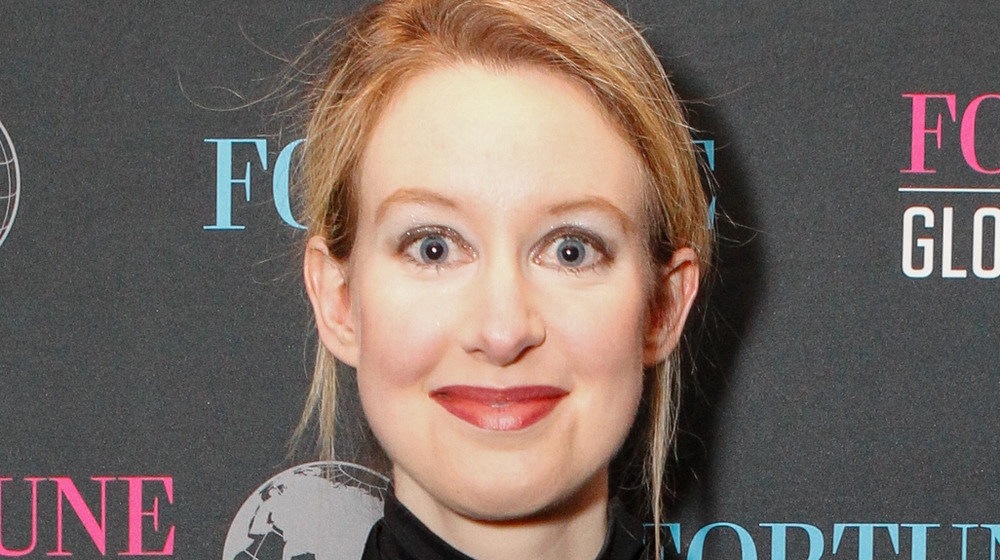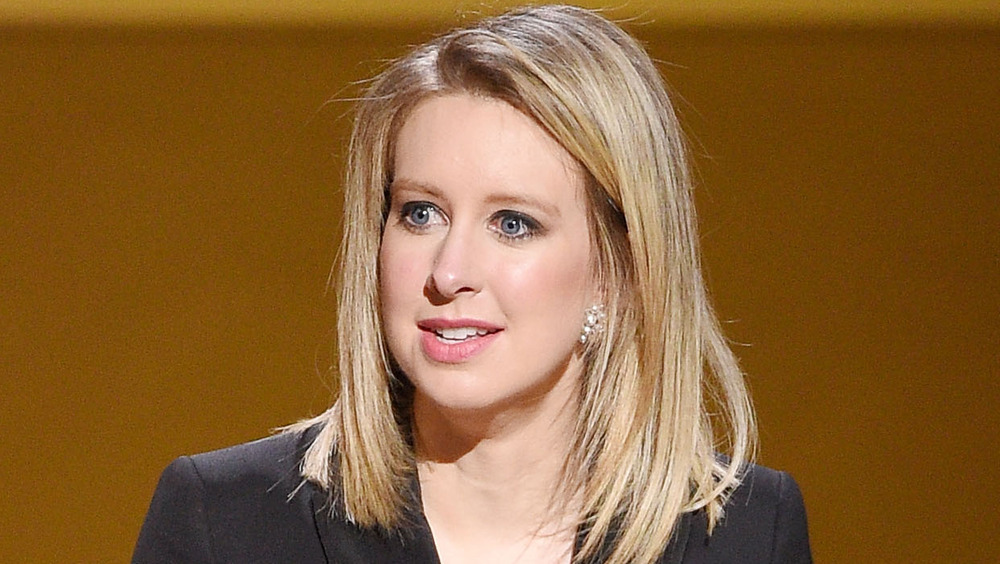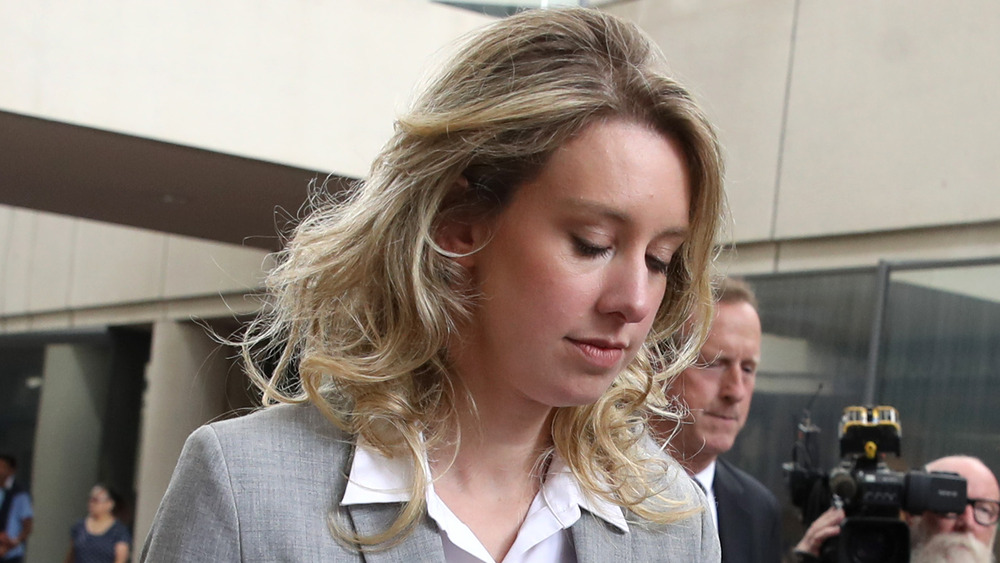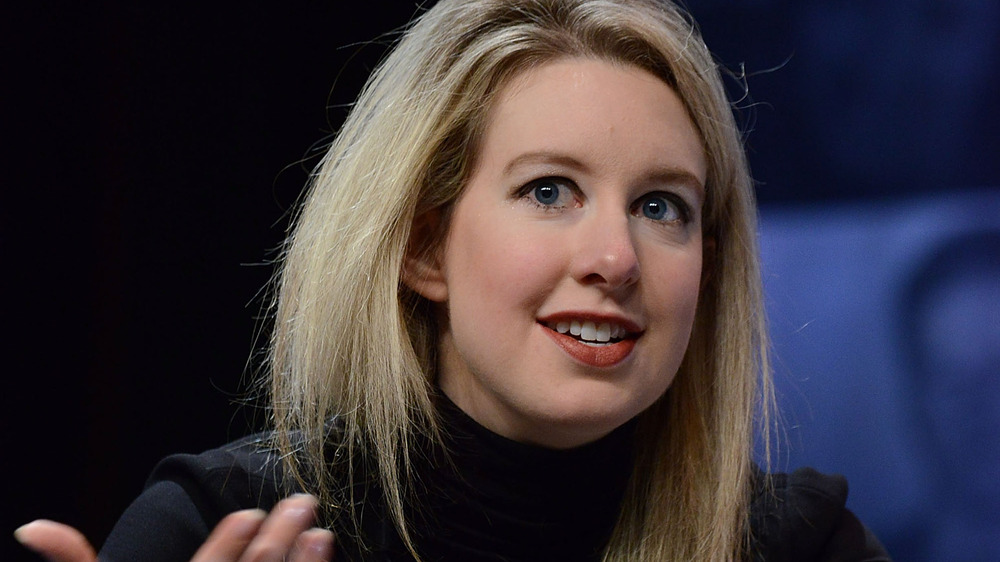The Real Reason Theranos Founder Elizabeth Holmes Is Trying To Hide Her Past
While it looks like the trial of former Theranos CEO Elizabeth Holmes is still set to take place in late 2021 after it was once again delayed — the first two times, in December 2020 and February 2021, due to the ongoing coronavirus epidemic, the third time due to the news of Holmes' pregnancy in March 2021 — there's no guarantee that the conclusion of Holmes' story is anywhere near over.
Holmes, who was charged with fraud in 2018, has been the topic of media fascination for about as long as the 15 years Theranos existed. The Stanford University drop-out was only 19 years old when she first began presenting the mission of the company in 2003. It's name, a combination of the words "therapy" and "diagnosis," Theranos would revolutionize medicine through her singular her invention, the Edison. A contraption no larger than a milk crate, the machine, per Holmes, could process myriad diagnostic texts using only a drop of blood extracted from a patient. In short order, Holmes quickly attracted media attention for both her company and her unique position as a young female wunderkind in a sea of male Silicon Valley tycoons.
But as her investors, employees, and the public eventually discovered, the Edison was, and had always been, an illusion. And as the days tick by until Holmes will stand trial in a California court, it seems that her defense team's best bet might lie in Holmes' inscrutable persona — and even more importantly, her past.
Elizabeth Holmes' use of Theranos' money is integral to her case
As major media outlets like CNBC have noted throughout the course of their coverage on Elizabeth Holmes, the prosecution's case against her hinges on the following: Where exactly Holmes funneled funds from Theranos, once valuated at $9 billion at its capitalist zenith, and the reason why. According to a filing made by California prosecutors in January 2018, the whole purpose of Holmes' charade — one which included her company and the Edison, a machine which never worked and was designed by a technology that never existed — was a simple one, which boiled down to personal wealth.
In the court document itself (via CNBC), the prosecution called Holmes' creation of Theranos "a tool to better her personal situation," implying that her company might have been such from the very beginning. The motion also outlined the government's case, in their purview, was more or less clear-cut, due to "the causal connection between [Holmes'] fraud and the benefits at issue," which they further categorized as "strong."
While many might recall that the first wave of legal charges against Holmes in 2018 mainly concerned charges levied against her and Theranos by the Securities and Exchange Commission focused on the corporate end of things, the January 2021 filing focused more on where the money actually went. So where did it go?
Elizabeth Holmes may have had a partner-in-crime
Per a January 2021 report by CNBC, the prosecution's case against Elizabeth Holmes seemingly rests on a motive as old as crime itself: personal gain. As the news outlet cited, a motion filed by the attorneys at the time seemingly alleged that Holmes defrauded of her own company through money she parlayed from investors, which was then syphoned into maintaining the means to which she had grown accustomed. Per the document, these included "travel on private jets, stays in luxury hotels, and access to multiple assistants." But could there be another key factor at play? Possibly yes. And that key may be former Theranos COO Ramesh "Sunny" Balwani, who was also once Holmes' boyfriend.
As Business Insider noted in May 2018, Holmes' relationship with Balwani and the secrecy surrounding it seemingly served to those investigating the company as emblematic of how it was run. "It instantly became clear to me that she was lying to her board about this romantic relationship that she was having with the number two of the company, who by the way, was also about 20 years older," John Carreyrou, a Wall Street Journal reporter, who became the first to expose Theranos' misdeeds in 2015, recounted to Business Insider at the time. Per the SEC's own precedent in their initial charges against Holmes, Balwani was named as a de facto conspirator, meaning the ex-COO might have benefited personally in the same manner Holmes did.
Elizabeth Holmes' reputation could be unsalvageable after her trial
Even though Elizabeth Holmes' reasons for keeping her past under wraps might be entirely due to the fraud case against her (one which could land her in prison for up to 20 years, per CNBC), she might have a much more personal motive: her legacy. As Forbes and others noted following the disintegration of Theranos in 2018, Holmes had once been hailed as a feminist icon — one of the few female tech CEOs in a sea of hoodied Silicon Valley titans. Before her purported fraudulent web of lies was fully uncovered, Holmes herself benefited from being labeled as a force of feminist progressivism, and even more so, a bona fide visionary. It was par for the course for her to be featured on esteemed panels centered around women in business. The same went for receiving awards and honors for years before her arrest.
Unfortunately for Holmes, her reputation and status fell into ruin the same time her health tech empire did. And while the disgraced Theranos CEO once famously said, "First they think you're crazy, then they fight you, and then you change the world," it seems her impending trial and the final phase of the Theranos story will do the same — just not in the way she imagined.




